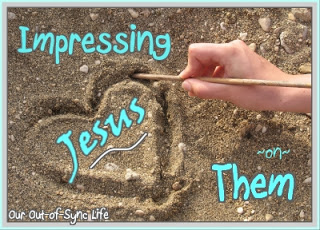 |
| credit |
Good vs. Godly.
For the past two days, we have been discussing the above topics. I realized that instead of desiring good, moral kids, my goal should be children who are godly and broken before their Savior.
Yesterday I shared the wisdom of a children’s minister at our church as she explained that if I desire my children to be godly and broken, I must be.
But what exactly does “godly” mean? Personally, how do I move from a good, legalistic moral person to a godly, broken woman face down at the cross?
To Google we go!
- I Timothy 6:11b “Pursue righteousness, godliness, faith, love, endurance and gentleness. ” {We are commanded to pursue godliness.}
- Ephesians 2:8-9 “For it is by grace you have been saved, through faith—and this is not from yourselves, it is the gift of God— not by works, so that no one can boast.” {Good is works, godly is grace.}
- “Good is the counterfeit, the imposter, the arch rival of God’s righteousness because it’s outward appearance mimics his righteousness many times but in reality it is based only on sinful man’s understanding of good and evil rather than our creators.” Robert Cole
- Good is based upon today’s world standard. {Good changes with time.} YouVersion Notes
- 2 Chronicles 16:9 “For the eyes of the Lord range throughout the earth to strengthen those whose hearts are fully committed to him.” The Lord is looking for people who are completely committed to Him. Jerry Watts
- “Goodness is performance based. Godliness is spirit based.” “Since goodness is performance based the standards are inconsistent. You call one thing good, another person calls it bad. Children may think that Dad’s desires based solely on his preferences may be the gospel. Godliness is good for all parts of life.” Dr. Lee Button
Good reacts for worldly praise. Godly desires to serve God.
Good takes credit for “good” in its life. Godly know there is no good but God (Luke 18:19).
Good is always striving to be better – works.
Godly understands that it will never be good enough and a Savior is required – grace. (Eph 2:8-9)
But, what does all of this mean for us as parents and teachers?
How do we raise godly children? What does that look like day-in and day-out?
How do we “impress” Jesus on the children in our lives?
Do my questions match your questions? Let’s continue to dig into this subject further.
Next: It Begins with Me
![]()
